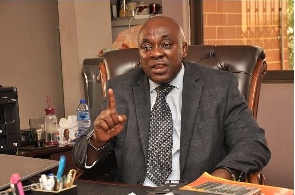WAS it a “political” act for the Director-General of the Ghana Broadcasting Corporation to write directly to the Chief Justice to set up special courts to adjudicate cases in which people have been arrested for non-payment of TV licensing fees?
The answer is yes.
For a law may exist in name only, and not indeed.
Good political reasons may persuade the police and other law enforcement agencies y to ignore many laws that are still in our statute book (mainly because “law reform” is a tortuous and time-consuming process). Enforcing such moribund laws could bring repercussions upon the head of the Government that was in power when the decision to enforce them was taken.
Did the Director-General of the GBC consider the possible political fallout when he made his request to the Chief Justice? I am sure he must be utterly fazed now by the reaction of the Minister of Information (for instance) who made no bones about the fact that the Director-General had not consulted either the National Media Commission or the Ministry of Information, before making his unusual request to the Chief Justice.
That aside, is it regular for a mere statutory body – in this case, a corporation that does engage in commercial activity in competition with industry rivals – to seek to influence the way and manner in which a major arm of the state machinery, the judiciary, does it work?
The independence of the judiciary is immutable and held in awe, and that's why some of us have, for instance, resisted a strong urge to implore the Chief Justice to issue sentencing guidelines to members of the Bench to upwardly review the sentences they impose on people convicted of crimes relating to galamsey. Currently, the sentencing of galamsey offenders is so derisory – as if by design – that we wonder whether members of the judiciary have taken any “notice” of the enormous damage that the galamsey operators have been doing to our water-bodies, rivers and streams. (I deliberately didn't say “judicial notice” because that has a technical meaning which does not apply here.)
Surely, judges and magistrates travel around the country and have seen with their own eyes, how rivers like Densu Birem, Offin, Prah, Ankobra Oti and others, have changed in colour from clear, near-blue, to dirty-mud-brow- yellow?
Do the members of the Bench not shudder when they contemplate the idea of drinking such water, even if it is purified by water-treatment plants before it reaches their dinner tables? They may drink safe, bottled water. But what about the water that's used to cook for them? Have they not read that some water-treatment plants have had to be shut down because mud from the galamsey-damaged rivers that feed the plants has clogged up the works? Aren't members of the Bench supposed to be so worldly-wise (because they are exposed to all the evil things that humans do) that they can assess situations correctly and try to save “Society” from its aberrant members? Why aren't they seeing the enormous harm that galamsey is inflicting on Ghana and hand down sentences that reflect the nature of the crime the galamseyers have been committing?
The Media Coalition Against Galamsey did try to draw the attention of the Chief Justice to the unbelievably mild sentences (usually fines) imposed upon those convicted of galamsey offences. The Chief Justice directed the Coalition to use the court system to address its concerns. Which I took to mean that the Coalition should appeal to superior courts to review the sentences that seemed to it to be too mild.
I have no problem with the CJ's decision to direct the Coalition to use the court's system. The decision challenges the Coalition to move away from mere voluble exhortations to real action. I am sure OccupyyGhana and other public-spirited institutions would willingly chip in, if asked politely, to give the Coalition the skilled manpower necessary to institute appeals in the higher courts against the scandalously “paltry fines” imposed on galamsey offenders by lower courts which seem unconcerned about the national emergency we face in the form of galamsey. But beyond that, I would humbly recommend to the CJ, nevertheless, the idea of issuing sentencing guidelines to the Bench on galamsey sentencing.
The situation with regard to sentencing guidelines in the UK (the country from which we derive most of our judicial principles/practice) is as follows:
“When sentencing an offender for an offence committed on or after 6 April 2010, a court must follow any relevant sentencing guidelines, unless it is contrary to the interests of justice to do so. When sentencing an offender for an offence committed before 6 April 2010, the courts must have regard to any relevant sentencing guidelines. Sentencing guidelines are available for most of the significant offences sentenced in the magistrates’ court and for a wide range of offences in the Crown Court. There is also guidance on general sentencing issues and principles. These guidelines are not specific to individual offences. Where no guideline exists, judges refer to the court of appeal judgements to examine how sentences have been reached for similar cases in the past.”
Now, to go back to the GBC issue: it raises the vexed question of the relationship between statutory bodies and the Ministries that administer them, and how that relationship affects the relationship of the statutory bodies to the other independent arms of the state, such as (in this case) the judiciary. I would have thought that in a matter that touches on governmental policy – i.e. whether the Government wishes to risk courting unpopularity by rigorously enforcing the law on the payment of licence fees – the Ministry of Information would be the right body to make that decision and seek the co-operation of the courts in implementing it. I suspect, however, that unlike the GBC, the Ministry would be sensitive enough not wish to give the impression that (as part of the Executive) it was seeking to influence the Judiciary on how to carry out its functions.
The fact that the GBC would be a financial beneficiary of a decision to use the courts to collect licence fees makes its case of making a direct approach to the judiciary directly, even worse. The issue brings to the fore, the danger of applying amateurish solutions to sensitive issues.
Two other misjudgements that occurred in our public life in the past month were also due, in my view, to an amateurish approach on the part of the persons/bodies concerned.
The Ministry of Trade should have anticipated the fact that seating at the President's “High Table” should NOT be linked in any way to financial contributions to whatever cause the event was in aid of. For if it was, political mischief could be made out of it. Of course, it would leak and – it did! Those versed in political praxis, as a profession, do not lay their Superiors open to such “banana skins”. In particular, they get schooled in and try to wear, two hats all the time: one party-political, and the other governmental. To mix the two up is careless in the extreme and disrespectful of the Presidency (they should be told in no uncertain manner).
The budgetary indiscretions of the Ministry of Special Development were also both naïve and amateurish. Such banal generalisations should not appear in a budget document. Having taken the political decisions over its projected expenditures, the Ministry should have handed the decisions to technical experts to craft the Estimates in a manner that would be requisite to good governmental practice.
The Parliamentary majority of the NPP should shoulder some of the blame for the contretemps – after all, it must have known that the Minister was relatively inexperienced and might make mistakes. Here again, professionalism was lacking. Just because a proposal has emanated from the same “majority side”, it should not be given “automatic” approval. Funnily enough, the “Senior Minister” episode demonstrates that Parliament can sometimes do its job properly. What happened in the case of the Special Development Ministry?
Politics never ceases to be amazing, does it?
- Ursula’s directives to GBC over DTT channel were extremely strange - Kwesi Pratt
- Ursula justifies decision to shut down 3 GBC channels
- You can’t reduce GBC channels – Minority to Communications Ministry
- GIBA bemoans moves to restrict free-to-air TV
- Government to force TV viewers to pay for free-to-air content - GIBA
- Read all related articles













